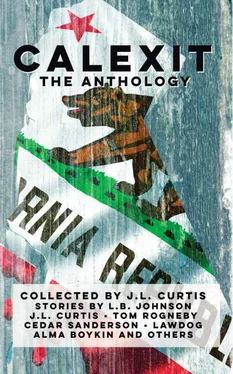She thanks the Lord for the warning phone call from her neighbor. Without it, she would have likely come in direct contact with whoever fired upon her. Looters? Militia? She didn’t know. Above her, the crests of the peaks were shrouded in cloud, lying motionless upon the land as if an obstacle to her path. She rides deep up into the mist and finds a place to hide for the remainder of the day.
* * *
She’s been three days back at home and there have been no further signs of any humans near the little mountain on which her home is perched. She went to call her neighbor and let him know what happened to find the line dead, likely cut up near the road. She had a ham radio. She wasn’t too skilled in its use but she could manage the basics. It was one of those things her dad had taught her. She realized he had probably wanted a son as well as a daughter, but in lacking one, he taught her all of those tasks he would have taught a male offspring. She knew how to hunt, to fish, to put up a tent, to build a fire, and to talk on the ham radio
She had a transceiver, a power supply (for now), an antenna, an antenna tuner, and a microphone. She’d already set up her distant neighbor, from whom she purchased hay for Taxi, as a QSO (contact). She never really made other contacts further away, but she knows if she talked to John down the hill he’d clue her in on what he had heard was happening from his children who lived in the city.
Unlike many of her old friends, she can’t play a video game to any sort of level, but she understands from her dad’s lessons how most things “work” and can make simple repairs to things with multiple moving parts. She hopes she never has to give herself an appendectomy with a sharp pen and a bottle of Knob Creek, but she can tend to a wound and do the basics to keep things running around here.
She realizes if she was on one of those “Survivor-style” shows, she’d lose, but not from not having the skills to survive, but mainly because she’s not a big fan of most other people, and the games involved in interacting with them in such settings. She’s glad now, that what little socializing she’s done has been with her boyfriend and his family down in the Valley. Her grooming customers already likely having left Meadowvale for civilization, there is probably no one other than her hay supplier, a good Christian man, who knows she is out here alone.
For now, she’s hunkering down, hoping that one day she wakes up to reliable utilities and a stream of tourists heading up to the big lake northeast of her. Until then, she will be ready as she can be, not sitting there waiting for her human savior or a handout, hands hanging pale and useless. Sometimes when you are left with nothing you still have your will for the hope to grab on to.
She doesn’t understand why so many of her neighbors were willing to sacrifice their personal liberty for that illusion of safety that comes from living under the authority of some higher power? Even as the Highest Power of all has conveyed these words to man — “God helps those who help themselves”.
With a loaf of bread baking in the solar oven out in the clearing in front of the house, she curls up with a book. She’s glad she has a well-stocked bookshelf, as with the power becoming occasionally intermittent, and her TV having gone Tango Uniform as her dad liked to say, there wasn’t a lot to do. The books were like gold in the hand, comfortable and secure.
With the books are those things that remind her why she chose to live her life the way she does now. There’s a flag and a small cross, ceremonial shapes of mortality, reminders that some choices are everlasting. There’s a tail from a whitetail, taken in a hunt, food for a winter’s table. There’s some spent brass that either guarded or honored a life, a piece of old uniform fabric and the scents of sandalwood and gunpowder and freedom that soak into her skin and bones like ink, to stay with her to the end of days.
Being prepared is harder work than remorse, a lesson that, as individuals, is easier to learn than as a nation.
She sits down to have a nightcap, carefully rationing out her supply of whisky, knowing she is unlikely to find more. She was glad when there was first the noise of a “scotch shortage” back in 2016 that she filled up the gun safe not just with her hunting rifles, pocket pistol, and revolver, but as many bottles of single malt as she could afford. She didn’t even want to think of how many dog butts she had to clean or how many stalls she had to muck out to pay for them.
But she was determined to at least get quality stuff. If the SHTF, as it appears it has, she didn’t want to be drinking from a bottle of Nasty McLand or something.
She thinks back to college when she and her roommates made some horrible concoctions of soda and some cheap American whiskey that smelled like an uncapped magic marker and tasted of sharp heat, the taste equivalent of pulling a hot cast iron pan off of the stove with your bare hand. A slight shudder ran through her.
It’s not just the thought of the taste that made her react this way, it’s a reminder that a year ago, she would be sharing this drink with her boyfriend of the last two years, a man she met when she boarded Taxi her horse down in the Valley before one forecasted brutal snowstorm. He didn’t have a ham radio, not sharing her love for such things, and gently teased her for prepping, assured that the land of milk and honey was just around the corner. Her cell phone had never really worked well up here and there had not been the sound of a car coming up the mountain in quite a while. She had no idea if he was alive or dead but she couldn’t risk leaving her property to make the drive down, only to have her vehicle “redistributed” to someone without a source of income other than the taxpayers. She knew he loved her, but he also had a disabled mother to care for and she knew he would not abandon his mom to come to her.
Outside, somewhere far in the distance, coyotes howl. She looks out into the darkness, into the ancient and inscrutable face of the night, seeing nothing, knowing that doesn’t mean that nothing is out there. The light fades, the wind is brisk, the flow of the outside lights, small incandescent intervals of safety around the house, challenge anyone to come near.
Before first light in the morning, she would make one last trip down the mountain with her truck. It was a risk, but she had to load up this winter’s hay from her neighbor, exchanging it for a little cash, some bread, garden vegetables, and a bottle or two of her whisky. She doesn’t think anyone with ill intentions will be out at 4 a.m. and she knows the road well enough to drive it under full moonlight, with no headlights.
The Calis still swarming out of the Valley, trying to flee what is left of California are always a threat: raping, robbing and sometimes killing, desperate for food or supplies, if the stories she has heard through her neighbor are to be believed. She’s only seen Militia, not looters, but she can’t be too careful. But she has to keep her horse well fed. For if she must, she will attempt to ride through the thick forest to Nevada, hoping she is not spotted and shot on sight by the militia.
Her revolver on her hip and a rifle lying on the bench seat of her old truck, she idles down the long trail to the road. Stopping to assess if there was anyone in the area, she moves the brush away from the entrance to the road, which is really no more than a trail at that point, barely big enough for a vehicle to pass. Putting everything back in place she travels down the hill to the equally hidden entrance to John’s house, moving slowly and quietly, so she can quickly abandon the truck on foot if there is an oncoming vehicle.
Her heart is pounding as she looks ahead to the road and then to the sky, stars flying upwards between ancient trees in a black sky. She sees them as brilliant staccato points in the sky that change to a wet sheet. She doesn’t realize she is crying as she makes her way down the hill.
Читать дальше










